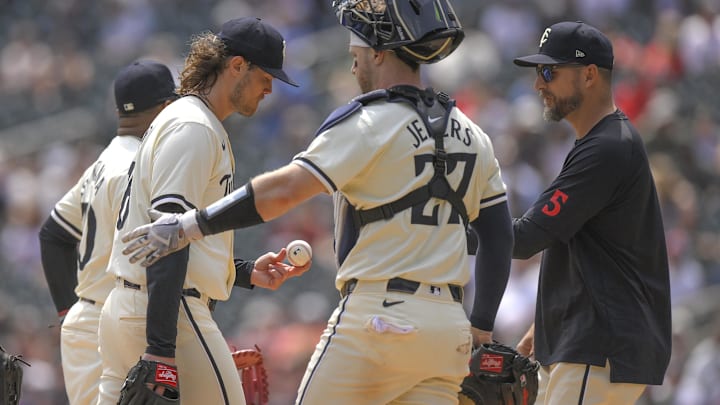Divvying out blame for the Twins' stunning collapse: Who is most at fault?

In this story:
One of the most disappointing Twins seasons of all time officially ended on Sunday, although they were eliminated from playoff contention on Friday to cap a stunning collapse that began six weeks earlier. After beating the Rangers on August 17th, the Twins were 70-53. From that point on, they finished 12-27 to end the season at 82-80, missing the playoffs despite having postseason odds of 95.8 percent on September 3.
When a team falls apart in the fashion that the Twins did, there's no shortage of blame to go around. But how should it be divided among the ownership, front office, manager, and players? This is my personal opinion on the share of responsibility that each of those four parties bears.
Ownership — 40 percent
It starts at the top with Joe Pohlad and the Twins' ownership. Cutting payroll by nearly $30 million last offseason, coming off the team's first playoff series victory in two decades, was a move that simply didn't have to happen. When billionaire owners treat a sports franchise like any other business, they shouldn't be surprised when attendance falls and the on-field product suffers.
The Twins' ownership slashed payroll, botched the television broadcast situation, and frankly, got what it deserved this year. That extra $30 million could've easily led to the four extra wins the team needed to reach the postseason.
Players — 30 percent
It can't all be on the ownership, considering four playoff teams — the Brewers, Orioles, Royals, and Tigers — had lower payrolls than the Twins this season. Ultimately, a lot of blame has to fall on the players on the field, who failed to get the job done as a collective group. They played horrific baseball during the 12-27 collapse and paid the price for it.
Injuries are part of sports, and losing Carlos Correa, Byron Buxton, and Joe Ryan hurt quite a bit. Those players were great when healthy and don't deserve much blame. Griffin Jax and Matt Wallner are excused too. Everyone else played a part in this, and that includes Pablo Lopez and Bailey Ober, who were excellent at times but inconsistent. Most of the blame falls on guys who had hot starts and then fell off the face of the earth (Royce Lewis, Jose Miranda, Ryan Jeffers) and the many players who never helped at all (Edouard Julien, Max Kepler, Manny Margot, Caleb Thielbar, Kyle Farmer, and too many others to name).
Derek Falvey and the front office — 20 percent
They were constrained by the reduction in payroll, but it was almost impressive how just about every low-level move Falvey and the front office made blew up in their face. Carlos Santana, signed to a one-year deal to play first base, was the only successful one. Offseason bullpen additions Steven Okert, Jay Jackson, and Josh Staumont all flopped. Due to injuries, Justin Topa didn't pitch until after the season was already toast and Anthony DeSclafani never pitched. Their lone trade deadline pickup, Trevor Richards, was a disaster. Lineup-wise, Margot and Farmer were dreadful.
Basically nothing worked. But because they were only working with what they had and so many of those moves were low-cost fliers, they only get 20 percent of the blame here.
Rocco Baldelli and the coaching staff — 10 percent
I have a hard time blaming Baldelli very much, considering he too was just working with what he had. He can't go out there and hit or pitch. But at the same time, as the manager of the team, I have to give him some portion of fault. Could he or his assistants have done something differently to motivate the team and find a way to halt the collapse? I don't know. Maybe. I agree with the Twins' decision to retain Baldelli in 2025, but from top to bottom, the organization has to figure out what went wrong and make sure something like this never happens again.

Will Ragatz is a senior writer for Vikings On SI, who also covers the Twins, Timberwolves, Gophers, and other Minnesota teams. He is a credentialed Minnesota Vikings beat reporter, covering the team extensively at practices, games and throughout the NFL draft and free agency period. Ragatz attended Northwestern University, where he studied at the prestigious Medill School of Journalism. During his time as a student, he covered Northwestern Wildcats football and basketball for SB Nation’s Inside NU, eventually serving as co-editor-in-chief in his junior year. In the fall of 2018, Will interned in Sports Illustrated’s newsroom in New York City, where he wrote articles on Major League Baseball, college football, and college basketball for SI.com.
Follow WillRagatz